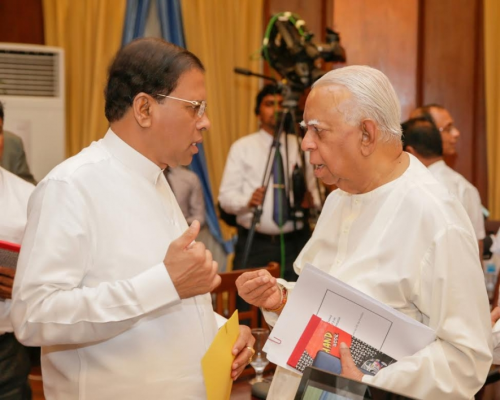A Brief Colonial History Of Ceylon(SriLanka)
Sri Lanka: One Island Two Nations
A Brief Colonial History Of Ceylon(SriLanka)
Sri Lanka: One Island Two Nations
(Full Story)
Search This Blog
Back to 500BC.
==========================
Thiranjala Weerasinghe sj.- One Island Two Nations
?????????????????????????????????????????????????Wednesday, November 30, 2016
Trouble once again in paradise

The fluid political situation in Sri Lanka, and the erosion of popular
support for the Sirisen a - W i c k r e m e s i n g h e combine, have
together created in the minds of the minority Tamils, doubts about the
regime’s ability to draft a Tamil-friendly constitution and face the
political storm that will certainly follow. Sensing a drift towards
abandonment of the constitution- making exercise and its substitution by
a few amendments to the existing constitution along with electoral
reforms, the MPs of the Tamil National Alliance (TNA), the largest Tamil
party in Parliament with 16 MPs, met President Maithripala Sirisena
recently to air their concerns. Sirisena assured the MPs that he is keen
on a new constitution as promised to the Tamils in the run-up to the
2015 presidential election, which he won thanks in part to the
overwhelming support of the Tamils.
However, the President made it clear he will have to get the support of
his political rival and former President Mahinda Rajapaksa, especially
for greater devolution of power to the Tamilspeaking provinces. He said
he has asked PM Ranil Wickremesinghe to discuss the issue with
Rajapaksa. While Tamil MPs do realise that support of Rajapaksa’s 50-
odd MPs in Parliament will be necessary for the draft constitution to
get the required twothirds majority, they also know Rajapaksa is a
Sinhala-Buddhist hardliner who has often said he will not give to the
Tamils in peacetime what he had denied LTTE leader Prabhakaran.
Rajapaksa had trashed the idea of federalism and agreed to hold
elections to the Northern Provincial Council only because of intense
Indian pressure and Japanese prodding. But he insisted on continuing
with a military man as the Northern Province governor despite objections
by elected Chief Minister Wigneswaran and the TNA.
Rajapaksa has very significant support among Sinhala- Buddhists who
account for 70 percent of Sri Lanka’s population. And the dominant view
among the Sinhalese is that devolution of power to a Tamil province will
end up in secession, thanks to the Tamils’ ingrained separatist
mentality and support from Tamil Nadu and the Western nations. If
Rajapaksa was defeated in the January 2015 presidential poll, it was
because the minorities voted en masse against him while the Sinhalese
were divided. But despite that setback, Rajapaksa bounced back in the
July 2015 parliamentary polls when his faction of the United Peoples’
Freedom Alliance (UPFA) came second behind Wickremesinghe’s United
National Party (UNP).
The faction led by Sirisena came third. In the past year, Rajapaksa has
been gaining ground, despite the many misappropriation cases filed
against his family members and political cohorts. A lack of cohesion in
the Sirisena-Wickremesinghe coalition, frequent changes in policy, an
inability to deliver on economic promises, concessions to the rich and
high indirect taxes on the common man have resulted in the Rajapaksa
regime shining in contrast. The rising tide in favour of Rajapaksa was
evident in the recent elections to rural cooperative societies where
Rajapaksa acolytes are thought to have swept the polls. Sensing lack of
support among the rural Sinhalese, Sirisena has kept postponing long
overdue polls to local bodies like the Pradeshiya Sabhas, urban councils
and municipalities. With the tide turning in his favour, it is unlikely
Rajapaksa will agree to Sirisena’s proposal to give Tamils more than
what has been given under the partly implemented 13th Amendment of the
constitution. But even this tattered document is viewed by the Sinhalese
as an 1987 Indian imposition which ought to be repealed. Tamil
politicians have also noticed that Sinhalese MPs in the various
constitution-drafting sub-committees do not take much interest in the
proceedings and are irregular in attendance; they are interested only in
electoral reforms.


